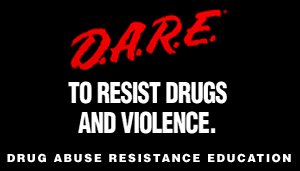1980s Cynicism, Drugs And The DARE Days
 I grew up during some really strange times. Like 1989. We had already braced through eight years of Ronald Reagan, and George Bush was getting ready to take the helm. I was in Mr. McLean’s sixth grade class when a special visitor arrived. We put our academic instruments away as Mr. McLean introduced a representative officer from the Los Angeles Police Department.
I grew up during some really strange times. Like 1989. We had already braced through eight years of Ronald Reagan, and George Bush was getting ready to take the helm. I was in Mr. McLean’s sixth grade class when a special visitor arrived. We put our academic instruments away as Mr. McLean introduced a representative officer from the Los Angeles Police Department.
The officer cleared his throat and began his DARE (Drug Abuse Resistance Education) presentation. He spoke in harsh pauses and serious overtones as explained that he was there on a special assignment from the White House. He was there to make sure that we remained drug free – and thus began my matriculation in drug abuse resistance education. I remember he was a young man, probably expecting a zoo-filled with inner city vermin. We looked blankly back at him and asked him why he never brought his gun into the classroom. He said it had to do with safety, similar why police officers never carried guns in airplanes. One of the boys in the back suggested to the officer that it was because he was afraid that we would bull rush him and take it from him. The police officer laughed nervously; after that day, the boy was reassigned to library service during future drug abuse resistance education and matriculation.
The police officer put a foot on a chair in order to demonstrate how “street” or “real” he was as he rested his elbow on his knee. He claimed he would tell it how it was. He brought in plastic bags of white powder and dried up leaves which were supposed to represent cocaine and marijuana. We took him as seriously as we had to. We saw it as an excuse to stop doing fractions, so we asked as many questions as it took in order to get us to lunchtime. We were given all kinds of propaganda – from stickers, to pencils and even t-shirts. We would have probably taken him more seriously if he had brought in the gun in the first place.
However, the reason why we did not take him that seriously was because he had ulterior motives. He wanted us to become low-level informants, by tattling on our parents, family members and neighbors.
This approach was flawed for two reasons. Alcohol and tobacco were lower-tiered members of the evil drug empire. Soon enough, my former class members were sobbing at the possibility that they might have to turn in their moms for having Friday night cocktails with their comadres. The second reason this did not work was because the police officer answered our questions with rhetoric.
“What is going to happen to us if we turn in our mom or dad, where will we go?”
“Well – you will go with someone that loves you enough not to do or sell drugs around you.”
“Like who?”
“Well that’s up to a judge to decide.”
“How will the judge know who loves me?”
“Well, because hopefully it will be someone who cares enough not to do or sell drugs around you – next question.”
We spent about eight Fridays memorizing the rhetoric and acting in skits about things we would do or say when faced by a situation where drugs would be offered. I remember my skit because I played a cop who offered drugs to girls at a party. The police officer stopped my skit and told me that I was wrong because police officers would never mess with drugs. Boy, the Rampart Scandal would do a sloppy job at reinforcing that notion.
At our DARE culmination, I was able to speak as the valedictorian. It was the kind of honor that I wore proudly – even though I was awarded the honor simply because I was the only one who showed up with a speech. Nevertheless, I spoke about the ills of drugs and how I would never fall for peer pressure.
Man, was I wrong.

